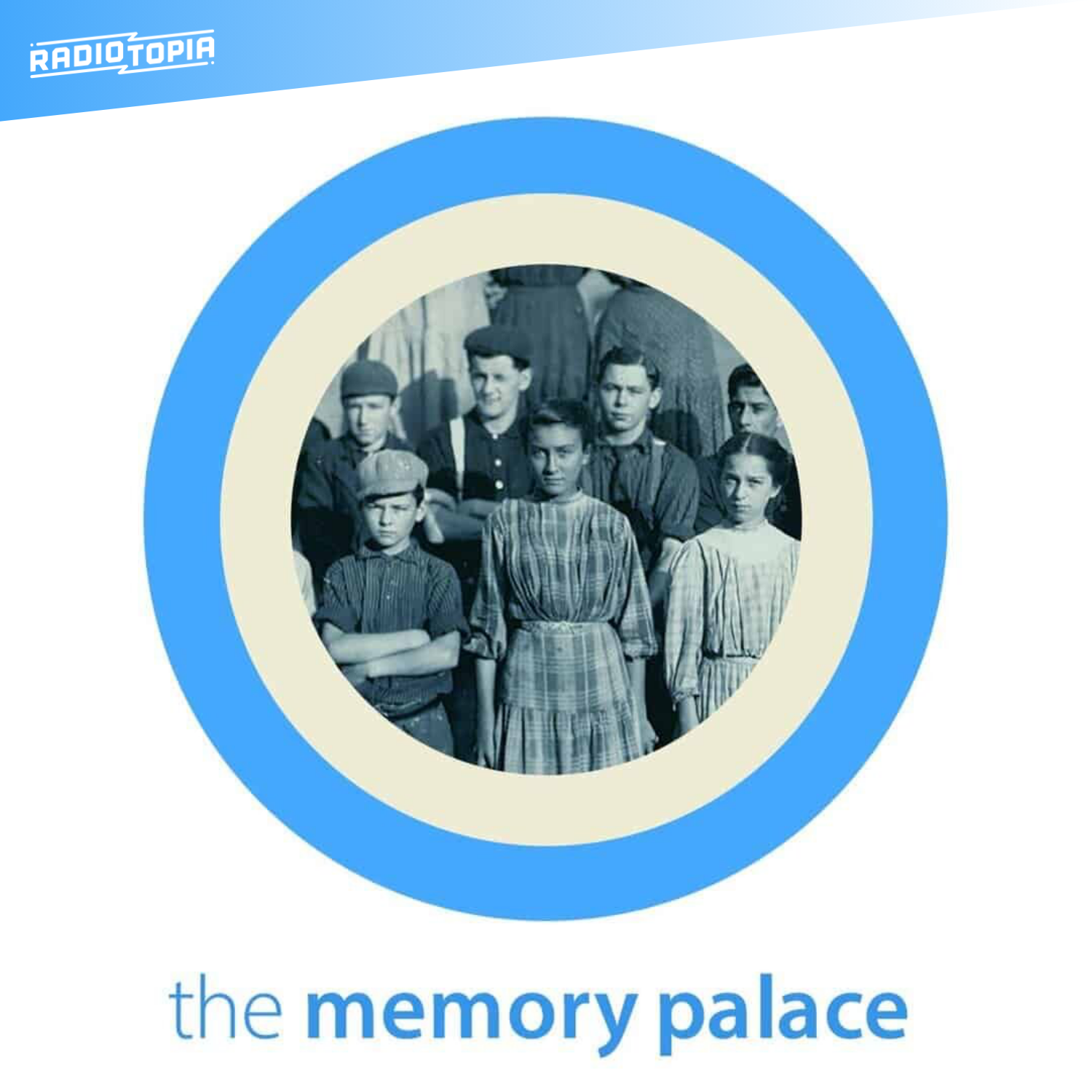Hazel, Mark, and a One-Time Juliet
The Memory Palace is a proud member of Radiotopia from PRX.
Music
- Traffico from Carlo Rustichelli's score to Divorzio All'Italiana and Una Braveta, from his score to Amici Miei.
- Tema Grottesco from Giovanni Fusco's score to L'avventura.
- Gloving it from Moondog.
- Musica Bionda from the score to The Sweet Body of Deborah
- The Peter Thomas Sound Orchestra plays Natascha from the score to The Perfect Marriage.
- Waltz from the Brendan Eder Ensemble
- Christa Schonfeldinger plays Grieg's Smarthold - der Kobold, on the glass armonica.
Learn about your ad choices: dovetail.prx.org/ad-choices
Press play and read along
Transcript
Speaker 1 Support for this podcast and the following message come from Sutter Health.
Speaker 1 Cancer diagnosis can be scary, which is why Sutter's compassionate team of oncologists, surgeons, and nurses work together as one dedicated team, providing personalized care for every patient.
Speaker 1 It's a whole cancer team on your team. Learn more at Sutterhealth.org.
Speaker 2 This episode of Memory Palace is brought to you by LifeKid. When you're a kid, you need all sorts of help, learning your ABCs, tying your shoes.
Speaker 2 Then you become a teenager and a young adult, and if you are like I was, you need all sorts of help, but you are hardly asking for or accepting any of it.
Speaker 2 Then you get older, you start looking around and thinking there has got to be a better or faster or safer way to do this thing, whatever that thing might be.
Speaker 2 And while you are looking around, you will notice that there's a ton of nonsense, there are a lot of quick fixes, a lot of just mumbo-jumbo.
Speaker 2 But then there's LifeKit, a podcast from NPR, where you can find thoughtful, expert-guided ideas and techniques about tackling issues in this thing we call Life.
Speaker 2 LifeKit delivers strategies to help you make meaningful, sustainable change. And the show is fun.
Speaker 2 You're flipping through episodes and bopping around thinking, yeah, I do kind of want to know what this whole thing is with seed oils and hear from people who really know and sort out the science from the hype.
Speaker 2 And then you put it on, and it is delightful and informative.
Speaker 2 And then you're kind of idly listening to this one about how you can avoid buying counterfeit products online and you're like, yeah, I do that technique.
Speaker 2 And yeah, I know that one too and yeah sure that one i'm no dummy but then you hear a couple more and you're like oh shoot yeah i almost fell for that yesterday and oh yeah i need that one for my back pocket life kit isn't just another podcast about self-improvement it is about understanding how to live a better life starting now listen now to the life kit podcast from npr
Speaker 2 This is the Memory Palace. I'm Nate Temeo.
Speaker 2 Hazel Kirk was a sensation.
Speaker 2 The play was the hottest ticket on Broadway from its very first performance at Madison Square Theater in September of 1878. Though on opening night, the theater itself was part of the draw.
Speaker 2
It was the best in the city. Maybe the world.
At least in terms of state-of-the-art amenities.
Speaker 2 It had a stage built on two levels, with two prosceniums, with two sets of curtains, and under each level, a hydraulic lift.
Speaker 2 So while the actors were performing on one stage, the lift was moving the next set into place, swapping a saloon out for a drawing room, say.
Speaker 2 And the actors would go up and down stairs from stage to stage, semi-seamlessly moving from scene to scene. No audience had seen anything like that.
Speaker 2 And that audience was kept cool or warm by an innovative, if a little primitive, HVAC system, which was a delicious novelty in those days, and would prove valuable as the seasons changed.
Speaker 2 And that was particularly helpful in the case of Hazel Kirk, a melodramatic epic that for years held the title of the most successful show in Broadway history, made Effie Elsler, a person we do not know now, but back in the 19th century, she was a superstar, thanks to playing the titular role in Hazel Kirk.
Speaker 2 This theatrical sensation that had lines going for Manhattan block after Manhattan block, that sustained a frenzy for tickets for 486 shows straight, a record-breaking Broadway run at the time, Hazel Kirk was the biggest thing going in the biggest city in America.
Speaker 2 So why was it playing in Canton, Mississippi at the very same time?
Speaker 2 Mark Claw was the manager of the Madison Square Theater, and a man who, on the one hand, never expected to become a detective, but on the other hand, was named Mark Claw, which is a pretty great name for a detective.
Speaker 2 And he turned out to be a pretty good one.
Speaker 2 Hazel Kirk was not scheduled to play anywhere but Broadway.
Speaker 2 Not at that point, not for well over two years when the New York production would move to Boston and when two touring companies would be sent out, one to Chicago, one to San Francisco, to bring the blockbuster play to eager audiences clamoring to see this Broadway juggernaut.
Speaker 2 Canton, Mississippi, whose population would be counted two years later by the United States Census at 3,404 souls, was not on the itinerary.
Speaker 2 But having heard word of this mysterious Mississippi production, Mark Claw caught a train at Grand Central Station and headed south.
Speaker 2 It may have been harder to find Canton itself than it was to find this illegal Hazelkirk when he got there, Because right as he got off the train on Thanksgiving morning, he was greeted by the sound of a ramshackle parade, comprised of 15 of the most raggedy, wretched, that was how Claw put it, group of so-called actors marching through Canton's so-called downtown, one of them beating a bass drum upon which was painted a sign advertising matinee performances of the Broadway sensation Hazelkirk that very weekend.
Speaker 2 The theater manager went into detection mode. He asked one of the marching actors just how it came to be that they were performing the hit of the Broadway season.
Speaker 2 How had they managed to secure the rights?
Speaker 2 Claw told them that he was an aspiring producer looking to set up his own productions, ones that may just have a part for an actor willing to provide a glimpse into the criminal underbelly of the 19th century theater world.
Speaker 2 The actors spilled.
Speaker 2 They told him that he could get just about any play for five or ten bucks.
Speaker 2 Now, this was a time before scanners and photocopy machines when a play's author and copyright holder had to hold those copies tightly, quite literally, lest they fall into the hands of someone who would mount their own production and make money they wouldn't pay to the play's rightful owners.
Speaker 2 So theater people like Mark Claw had to keep an eye on audiences.
Speaker 2 Security staff would scan the crowd and kick out anyone who seemed to be taking notes during a show, but yet play pirates, that is what they called them, were still managing to pirate plays.
Speaker 2 The actor told Claw about a recent innovation in theatrical theft. The pirates had taken to hiring stenographers who could write in shorthand and take everything down as it was spoken.
Speaker 2 They would be sent to the theater with a massive sheet of paper that had been meticulously folded into a tiny structure, bent and twisted like some ingenious criminal origami, such that it could fit in the stenographer's pocket, who would then scribble with a pencil nub blindly, right there in the pocket, while flipping and folding the page in a precise sequence as he went, so it could be unfolded and decoded later on.
Speaker 2 Meanwhile, elsewhere in the theater would be an accomplice, whose job it was to pay attention to everything but the dialogue, the entrances and exits, the sets and the cues, what they called the business of the play.
Speaker 2 And that was fine for a short play, a comedic one-act, maybe even typical Broadway fair. Those things might have been able to be scribbled down on a shorthand sheet.
Speaker 2
while another guy captured the business. But Hazel Kirk just had so much business.
It was a four-act, three-hour long melodramatic extravaganza with 15 actors playing multiple roles.
Speaker 2 There are love triangles, a near-fatal drowning, evil schemes, ludicrous action, miraculous rescues, preposterous plot twists that all played out on spectacular sets that had been specifically designed for the best theater on Broadway, not for whatever they had in Canton, Mississippi.
Speaker 2 Mark Claw knocked on the door of the producer later that day, interrupting the man's Thanksgiving dinner, and told him that he was looking to buy a copy of the play for himself.
Speaker 2 Where could he get one? He was given the address of a couple in New York City.
Speaker 2 Then Claude told him who he really was, and the man went ashen and was all blubbering apologies and groveling, hoping not to be sued. Claude just told him to shut the show down.
Speaker 2 He had bigger fish to fry.
Speaker 2 Adeline Gasperini. was a remarkable Juliet.
Speaker 2 One of America's biggest theater critics called her star turn as the star-crossed lover, one of the best debuts he'd ever seen. The New York Times raved about her performance in The Lady of Lyon,
Speaker 2 called her comely, said she exuded a graceful intelligence. Her career was on the rise, until Marclaw knocked on her door.
Speaker 2
He said he was a theatrical agent. He'd heard he could buy a copy of Hazel Kirk.
He was told he'd come to the right place. Hazel Kirk could be had for 10 bucks.
Speaker 2
He had 10 bucks. When he was handed the script, he noticed it was in a woman's hand.
He asked the comely Miss Gasperini if this was her work. She was happy to take credit.
How'd she pull it off?
Speaker 2
He asked. Did she use shorthand? Did she have accomplices? The show was so long and so complicated.
She must have had an ingenious plan with complications to match.
Speaker 2 She told him she was an actress.
Speaker 2
She just memorized the lines. She caught the show six times, and and each time she'd go home and write it all out.
It was pretty easy for her.
Speaker 2 She was an actor of grace and intelligence.
Speaker 2 Though not for much longer.
Speaker 2 Mark Claw left, but later the cops came by. The actress wasn't arrested, nor was her husband, her partner in the scam.
Speaker 2 It seems they were let off the hook in exchange for coughing up the names of the people who had bought copies of the show, so no jail time for Adelina Gasperini.
Speaker 2
But her time in the theater was over. The scandal sunk her career.
Meanwhile, Mark Claw leaned into this new criminal justice aspect of his own, busting play piracy rackets in other cities.
Speaker 2 Two guys got three years in jail each for trying to mount Hazel Kirk in Chicago. So they were locked up when its official production rolled into town and sold out shows for months on end.
Speaker 2
As it did all over the country. where it was an enormous hit.
A cultural juggernaut. With massive productions in Europe and the UK, Canada, and Australia.
Speaker 2 For the next 30 years, well into the 20th century, not a single day went by when there wasn't an official production of Hazel Kirk playing somewhere.
Speaker 2 But not even the most graceful and intelligent among us can remember that now.
Speaker 2 This episode of The Memory Palace was written and produced by me, Nate DeMayo, in May of 2024. The show gets research assistance from Elise McGraw.
Speaker 2 It is a proud member of Radiotopia, a network of independently owned and operated listener-supported podcasts from PRX, a not-for-profit public media company.
Speaker 2 And it is because of those things, independence and PRX's mission-driven dedication to independence and putting art and artists' needs over the needs for profit and market share.
Speaker 2 It is because of that that this show gets to be what it is.
Speaker 2 If you like this show, that, my friends, that commitment and support from PRX and Radiotopia and from listeners like you is what allows me to make this show this way.
Speaker 2 on my terms, following my own vision or muse or whatever you want to call it.
Speaker 2 If you want to help me do that, if you want to help me make the show, you can consider making a donation at thememorypalas.us slash donate.
Speaker 2 If you want to follow me on social media, you can find me on Twitter and Facebook at thememory palace, on Instagram and threads at thememory palace podcast.
Speaker 2 If you want to meet me back here in the credits of the next episode, I will tell you all about how you can subscribe to my new newsletter.
Speaker 2 And in the meantime, if you want to draw me a line, you can always do so at nate at thememorypalace.us.
Speaker 2 Radiotopia
Speaker 2 from PRX





